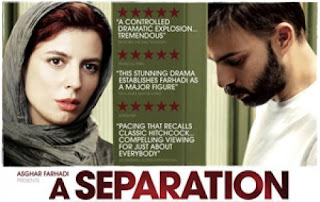 |
| Critical acclaim, for all the right reasons. |
The primary theme of 2011's Iranian drama 'A Separation' is that of misery and strife at the hands of loved ones during difficult times, in particular divorce and its subsequent effects. Despite its unabashedly Iranian origin and production, it's appeal remains universal, with it perhaps being even more relevant to a western audience as I think it's fair to say that divorce is an inherent part of our culture compared to others.
Indeed, the separating couples young daughter is indirectly highlighted as the crux of the film, with every question asked and decision made with her in mind which prompts us to strongly relate and sympathise with the couple displaying a true sense of devotion to their child., which is an essentially universal human trait. In addition to our empathy with their daughter, the husband's unwell elderly Father provides an added frustration as his helplessness leads to many unfortunate situations, clearly putting the family in difficulty throughout the film.
 |
| Family man. |
Despite this, the family's refusal to give up on each other reflects a strong image of family life in Iran, that it is very hospitable and caring from beginning to end. However, this film could not have been distributed without the Iranian government's approval , which one can't help but feel as though this regulated the film's depiction of a disparagingly poor family life and thus regulated it somewhat. As opposed to this of course is the fact that the film's authenticity seems unmistakeable - it's entirely Iranian production, funding and setting is unavoidable, so it could be said that the display of devout kindness to family and their kin is an important role in Iranian life.
Another feature of Iranian life that runs concurrently with family in the film is that of class and religion. The recently employed female carer of the elderly man, later embroiled in a legal dispute with the family over an alleged attack, is forced to take the job for economical reasons as her noticeably lower class background, especially when compared to the main family, demonstrates just how she needs the money. She is at great pains to do this work though, as she frequently seeks advice as to whether or not her work is a "sin" in relation to her strong Islamic faith.
 |
| Opening of the film at a divorce court hearing. |
This feels like a critical look at the Islamic faith and its theocracy over Iran, as she suffers over deciding what is the right thing to do, although later in the film when offered enough money to settle her and her husbands financial woes, she rejects it as she is unsure of whether or not she'd, again, be committing a sin due to the ambiguity of some facts on her behalf.
These religious choices seem as though they don't always satisfy and adhere to your own personal needs, but ultimately drives you to execute the correct moral decision, thus painting the Islamic faith in an apparent positive light. This even sided look at the practicalities of religion provides us with a uniquely thought provoking state of mind, which I firmly see as the essential skill required in a top class director/writer.
No comments:
Post a Comment